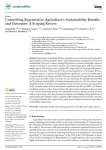Rai P., Godfrey S.S., Storer C.E., Behrendt K., Ip R.H.L., Nordblom T.L. (2025). Unravelling regenerative agriculture’s sustainability benefits and outcomes: a scoping review. Sustainability, 01/02/2025, vol. 17, n. 3, p. 981.
https://doi.org/10.3390/su17030981
https://doi.org/10.3390/su17030981
| Titre : | Unravelling regenerative agriculture’s sustainability benefits and outcomes: a scoping review (2025) |
| Auteurs : | P. Rai ; S.S. Godfrey ; C.E. Storer ; K. Behrendt ; R.H.L. Ip ; T.L. Nordblom |
| Type de document : | Article |
| Dans : | Sustainability (vol. 17, n. 3, February 2025) |
| Article en page(s) : | p. 981 |
| Langues : | Anglais |
| Langues du résumé : | Anglais |
| Catégories : |
Catégories principales 06 - AGRICULTURE. FORÊTS. PÊCHES ; 6.4 - Production Agricole. Système de ProductionThésaurus IAMM SYSTEME DE PRODUCTION ; PRATIQUE AGRICOLE ; DURABILITE ; REGENERATION |
| Mots-clés: | AGRICULTURE REGENERATRICE |
| Résumé : | Regenerative Agriculture (RA) has emerged as an environment-centric agriculture that prioritises reducing synthetic inputs, emphasising holistic management focussed on sustainability. However, evidence linking RA practices to desired sustainable outcomes remains inconclusive, and today?s modern conventional agriculture (MCA) prioritises similar aspects. This scoping review explores RA's origins and how its proponents perceive sustainable outcomes. Following the Preferred Reporting Items for Systematic Reviews and Meta-Analyses?extension for Scoping Reviews guidelines, our review searched peer-reviewed articles from Scopus and Web of Science, along with a Google Scholar snowball search, up to July 2024. Of the 71 articles reviewed in detail, 46 explicitly discussed RA, and 25 addressed sustainability or holistic management relevant to RA. Key research gaps identified include: (1) Despite varying definitions and uncertain outcomes, growing interest in RA warrants further research into farmers' preferences for RA over MCA. (2) There is insufficient evidence on how farmers balance the interconnected elements in the economic, social, and environmental domains for sustainable outcomes. (3) RA practices are often unclear and overlap with other production methods, necessitating clearer definitions of input systems and strategies used to comprehend RA's biophysical and economic outcomes. A conceptual framework is proposed to guide future research and inform agricultural sustainability programmes. |
| Cote : | En ligne |
| URL / DOI : | https://doi.org/10.3390/su17030981 |







